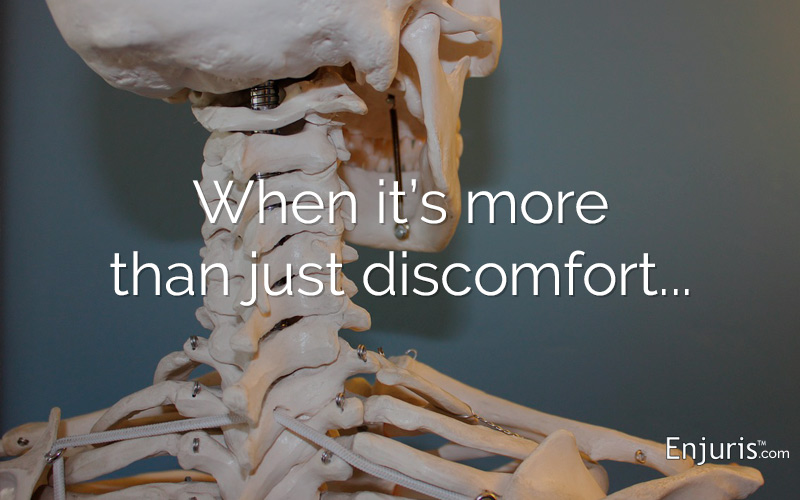Learn the symptoms and when you can recover damages
The National Spinal Cord Injury Statistical Center reports approximately 28,000 cases of spinal cord injury across the United States, and that doesn’t include the number of people simply suffering from neck or back pain.
Serious neck and back pain — true, debilitating pain, not just discomfort from sitting too long — can derail a person’s life. Recovery might mean months of rehabilitation and/or surgeries, and that can lead to financial burdens on you and your family.
Many of these injuries are caused by someone else’s negligence, whether it was a property owner, reckless driver or someone just being careless. Falls at work and other workplace accidents are also common causes of neck and back injuries. Depending on what caused your injury, there’s a good chance you are eligible for compensation to help offset your medical bills and financial responsibility.
Common neck or back injuries from an accident
The phrase “neck or back injury” is a broad term for many different painful conditions. Any injury is sure to cause pain and discomfort, and could limit your activity. Nevertheless, the severity of these injuries vary greatly. The spectrum of neck and back injuries include:
- Whiplash
- Sprains and strains
- Herniated disc
- Cervical dislocation
- Stingers and burners
- Fractured disc or vertebrae
- Mechanical back pain (including musculoskeletal injuries to the spinal joints, discs, vertebrae, tissue, etc.)
- Tetraplegia/quadriplegia
- Paraplegia
As the long-term effects of these injuries differ significantly, the damages and workers’ comp payouts will vary depending on your injury and the strength of your case. A Georgia personal injury attorney or a workers’ comp attorney will help you determine if your case is worth pursuing.
Signs you suffered a neck or back injury
The first step to getting help is identifying your neck or back injury. These types of injuries can be as minor as whiplash (the most common neck injury) or as major as complete paralysis.
After an accident, adrenaline may prevent your body from feeling the full severity of the pain until days or weeks later. This is particularly dangerous if you’re seriously injured and don’t realize you need treatment. Without proper care, the injury could cause permanent damage, and possibly even death. For this reason, it’s always advised that you receive medical attention immediately after an accident.
Neck and back injuries don’t always cause severe damage. Nevertheless, the Mayo Clinic advises that you visit your primary care physician if you demonstrate any of the following symptoms:
- Limited movement or complete inability to move
- Loss or altered sensation, including the ability to feel heat, cold and touch
- Loss of bowel or bladder control
- Exaggerated reflex activities or spasms
- Changes in sexual function, sexual sensitivity and/or fertility
- Pain or an intense stinging sensation
- Difficulty breathing, coughing or clearing mucus or phlegm from your lungs
The more dangerous symptoms include:
- Extreme back pain or pressure in your neck, head or back
- Weakness, incoordination or paralysis in any part of your body
- Numbness, tingling or loss of sensation in your hands, fingers, feet or toes
- Loss of bladder or bowel control
- Difficulty with balance and walking
- Impaired breathing after injury
If you or a loved one have any of the above symptoms, visit the emergency room as soon as possible to prevent permanent damage.
Tweet this
Who is liable for my neck or back injury damages?
If you or a loved one is suffering from a neck or back injury, the medical bills are probably piling up. The accident victim is likely to have missed a lot of work, too, if they’re well enough to return to their job.
You can recover damages to compensate for your neck or back injury in 3 situations:
Workers’ compensation
Workers’ compensation is available for anyone whose neck or back injury came from a workplace accident. Georgia workers’ compensation benefits are comprehensive, but the proper filing and documentation must occur before you receive your payout.
In some cases, a hearing may also be needed to prove the cause of your injury and the extent of your physical limitations or pain. We encourage you to speak with a workers’ compensation attorney in order to maximize your potential recovery.
An accident or negligence lawsuit
Accident or negligence claims are perhaps the most common method of recovery for damages covering neck or back injuries. Here, someone else unintentionally caused your harm that contributed to your injury. Though car accidents are the most common example, slip and falls, medical malpractice, insufficient supervision and products liability are all potential causes of neck and back injuries.
Georgia is a modified comparative fault state. This means that someone needs to have been at least 51% responsible for your accident in order for you to receive compensation. For these cases, a Georgia personal injury attorney will evaluate your claim and help you decide if you should settle or pursue litigation.
Criminal activity
In perhaps the worst case scenario, someone may have been trying to hurt you or a loved one. Domestic violence and assault are examples of crimes where a victim may have suffered a neck or back injury. When criminal acts cause injury, there’s a typically a criminal trial and a personal injury case for something called an “intentional tort.”
Punitive damages are also possible in these cases to economically punish whoever caused you harm. As the police report, criminal trial and other evidence may contribute to a higher payout for you, we encourage you to consult a personal injury attorney for these cases as well.
Damages available for neck and back injuries
Depending on the severity of the accident, neck and back injuries may have long term effects. Physical therapy and surgery may be needed both at the time of the accident and in the future. Damages for these injuries often pay well in order to cover the costly medical treatment, rehabilitation and lost income. In Georgia, damages are divided into two categories: special and general.
Special damages are economic damages associated with monetary loss or expenses. The totals are easy to calculate, and the bills are easy to verify. Some examples of special damages include:
- Current and future medical expenses
- Lost wages and time at work
- Property damages
- Funeral costs in the case of a wrongful death claim
General damages refer to non-economic losses. These losses are for things that don’t have a price tag. The totals aren’t obvious, and Georgia allows the jury to decide on the reasonable costs for these damages. Some examples of general damages include:
- Pain and suffering
- Emotional trauma
- Loss of quality of life
- Loss of companionship in the case of a wrongful death claim
A Georgia personal injury attorney or workers’ comp lawyer will be able to help you sort through all of your expenses and explain which damages you’re likely to recover.
See our guide Choosing a personal injury attorney.


